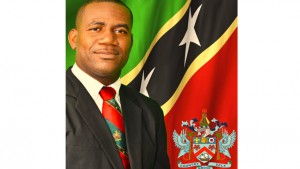 Deputy Prime Minister and Minister of Education, the Honourable Shawn Richards, has said that that there has been a slight improvement by the Nevis Sixth Form College in the Caribbean Advanced Proficiency Examination (CAPE), while the Clarence Fitzroy Bryant College (CFBC) has received better results. He has congratulated the students for their hard work, the lecturers for their dedicated service and the parents for their ardent support.
Deputy Prime Minister and Minister of Education, the Honourable Shawn Richards, has said that that there has been a slight improvement by the Nevis Sixth Form College in the Caribbean Advanced Proficiency Examination (CAPE), while the Clarence Fitzroy Bryant College (CFBC) has received better results. He has congratulated the students for their hard work, the lecturers for their dedicated service and the parents for their ardent support.
“It is apparent however that much work needs to be done in a number of subject areas to ensure that our students get the very best chance of achieving success in their studies,” said Minister Richards.
The Education Minister said that the total number of candidates in both colleges sitting the 2015 May-June CAPE Examinations was 519, compared to 514 in 2015. Exams were written in 48 units across St. Kitts and Nevis. There were 1923 subject entries compared to1855 in 2015, with 1649 entries returning passing grades for a national average pass rate at CAPE for 2016 of 85.75 compared to 85.84% in 2015 and 84.66% in 2014.
Minister Richards said that the CAPE results for the CFBC for the academic year ending 2016 saw 378 students registered for the CAPE Examinations compared to 371 in 2015 and 335 in 2014.
“There were 1306 registered subject entries compared to 1248 in 2015,” said Minister Richards. “Of the 1306 registered subject entries at the CFBC for the 2016 examinations, 86.52% or 1130 entries returned a passing grade, of which ones and twos were 23.41%.”
Minister Richards revealed that the following subjects returned a 100% pass rate: Applied Mathematics Unit 2, Art and Design Units 1 and 2, Computer Science Unit 2, Digital Media Units 1 and 2, Entrepreneurship Unit 1, Environmental Science Unit 1, French Units 1 and 2, Geography Unit 1, History Unit 1, Information Technology Unit 2, Performing Arts Unit 1 and Performing Arts Unit 2 – Dance Option, Physics Unit 1 and 2, Pure Mathematics Unit 2 and Spanish Units 1 and 2. All other subjects returned a 73.08% – 98.19% pass rate except Biology Unit 1 – 20%, Chemistry Unit 1 – 40.63%, Economics Unit 1 and 2, 52.17% and 50% respectively, Integrated Mathematics, written for the first time this year, at 52.55% and History Unit 2 at 60%.
Pertaining to the Nevis Sixth Form College there were a total of 141 candidates compared to 144 in 2015, and 119 in 2014.
“There were 617 registered subject entries, compared to 588 in 2015,” he said. “Of the 617 subject entries registered for CAPE at the Nevis Sixth Form College, 519 or 84.12% compared to 81.46% in 2015.”
The following subjects attained a 100% pass rate: Applied Mathematics Unit 1, Art & Design Unit 1, Biology Units 1 & 2, Building & Mechanical Engineering Unit 1 – Mechanical Option, Chemistry 2, French Units 1 & 2, Geography Unit 1, History Unit 2, Information Technology Unit 2, Management of Business Unit 1, Pure Mathematics Unit 2 and Spanish Units 1 & 2. All other subjects returned a 71.43 – 98.75% pass rate except Geography Unit 2 – 0% (1 candidate), Literatures in English Unit 2 – 33.33% (3 candidates), Integrated Mathematics – 36.96%, Literatures in English Unit 1 – 42.86%, History Unit 1- 50%, Economics Unit 1 – 52.17%, Pure Mathematics Unit 1 – 60%, Accounting Unit 1 – 66.67%, Economics Unit 2 – 69.57%.
Minister Richards took the opportunity to congratulate the students and lecturers at the Nevis Sixth Form College and the CFBC, Division of Arts, Sciences and General Studies (ASGS) for their diligence.
“In most instances that has contributed to another year of sterling performance by our students. I commend the parents for their support,” said the Minister.
CAPE is taken by students in the Division of Arts, Sciences and General Studies at the CFBC, and at the Nevis Sixth Form College. Students write CAPE Examinations at Unit 1 and Unit 2 in selected subject areas, usually taking Unit 1 in their first year of study and Unit 2 in their second year and have five (5) years in which to obtain an Associate’s Degree.
